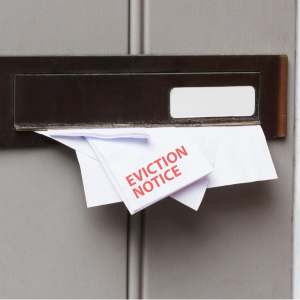
Understanding the Eviction Process for Mobile Home Owners
The eviction process is intricate to the mobile home tenants’ rights to make informed decisions. The initial stage includes providing written notification, which almost always encompasses one or several reasons below: non-payment of rent or violation of the lease agreement.
This Notice also warns the Tenant that they must deal with the issue or vacate the premises on or before a deadline. If the Tenant fails to comply with the notice, the Landlord has the right to initiate an unlawful detainer action and petition the court for the Tenant’s eviction.
At this stage, the tenants can present evidence in court and may refute the landlord’s evidence. If the court verdict is in the landlord’s favor, the landlord gets a writ of possession, which permits law enforcement to execute eviction if required.
Acquiring legal counsel could greatly help each mobile homeowner, especially during the eviction process regarding their home, understanding how state laws and mobile regulations interact with time-bound policies. Communication must be maintained, and all negotiable payment conflicts must be settled before formal eviction procedures begin.
Do Mobile Homes Accept Evictions?
Mobile homes are no different from other residences because they can be set up for eviction. Your considerations about mobile home eviction laws need to consider the laws surrounding mobile home parks and the applicable tenant laws.
Evictions can occur due to non-payment of rent, violation of park rules, or lease expiration without renewal. Once an eviction notice is served, residents must adhere to the timeline specified by local laws or risk further legal action.
Mobile home owners who own their homes outright but rent the land may need to relocate; however, this process can be costly and complicated due to logistics and zoning regulations. For those renting the mobile home and the land, eviction typically means finding alternative housing. If you need to sell your mobile homes in Texas, Mobile Home Cash Offer offers a straightforward cash offer to help ease your transition.
Understanding these dynamics is essential for anyone residing in mobile home communities, as it allows them to be prepared for potential evictions and know what steps they need to take should such a situation arise.
Legal Rights of Mobile Home Residents Facing Eviction

Mobile home residents facing eviction have specific legal rights to protect them during this challenging process. Understanding these rights is crucial for tenants, as they can vary depending on state and local laws.
Generally, mobile home owners are entitled to a written notice of eviction that specifies the reason for termination of tenancy, such as non-payment of rent or violation of park rules. The notice period may differ based on jurisdiction, but it typically allows residents time to remedy or prepare for relocation.
Tenants should be aware that they cannot be forcibly removed from their homes without a court order and have the right to contest an eviction in court if they believe it is unjustified. Additionally, mobile home residents might have protections under federal laws if the community receives government assistance or subsidies.
Legal aid organizations often support those who need help navigating eviction proceedings, ensuring tenants’ rights are upheld.
What Happens If I Walk Away From My Mobile Home?
Abandoning a mobile home after eviction can have significant financial and legal consequences. When a homeowner decides to walk away from their mobile home, the property may be considered abandoned, leading to potential foreclosure by lienholders.
This can severely impact the homeowner’s credit score, challenging future housing acquisitions. Additionally, local governments might impose fines or fees for any environmental hazards or code violations associated with the neglected property.
The mobile home’s condition could deteriorate rapidly without proper maintenance, further devaluing it and complicating resale opportunities. Homeowners should also be aware of any personal property left behind, as they may lose access to these belongings once the eviction process is complete.
Seeking legal advice and exploring alternatives, like selling or transferring ownership before walking away, can help mitigate some of these adverse outcomes and provide more sustainable housing solutions. This is where Mobile Home Cash Offer comes in! We pay cash for your mobile home and then sell it to the end buyer via owner financing!
Common Causes of Evictions in Mobile Home Communities
Evictions in mobile home communities can arise from various issues tenants may encounter. One common cause is the non-payment of lot rent, which often leads to landlords initiating eviction proceedings.
Another significant factor is the violation of community rules and regulations, such as failing to maintain the property correctly or engaging in disruptive behavior that disturbs other residents. Lease agreement breaches, like unauthorized subletting or having pets when prohibited, can also trigger eviction notices.
In some cases, tenants may face eviction due to illegal activities on the premises, violating local laws and community standards. Management’s regular inspections might reveal safety hazards or code violations within a mobile home, prompting an eviction if these issues are not promptly addressed.
Understanding these common causes is crucial for tenants to avoid eviction and remain in good standing within their mobile home community. Contact us for legal advice and expert guidance on facing an eviction from your mobile home.
Understanding Lease Agreements in the Context of Mobile Homes
Understanding lease agreements is crucial for mobile home tenants, especially in the context of eviction. A lease agreement outlines the terms and conditions under which a tenant rents a mobile home or the land upon which it sits.
These legally binding documents specify details such as rent amounts, payment schedules, maintenance responsibilities, and duration of tenancy. Notably, they also include clauses that address eviction processes.
For mobile home residents, it’s vital to comprehend whether their lease covers just the land or both the land and the dwelling itself. This distinction can significantly impact eviction proceedings and tenant rights.
Reviewing these agreements thoroughly can help tenants understand what actions might lead to eviction and their legal protections under state-specific landlord-tenant laws. Knowing these details ensures tenants fully know their obligations and rights, helping them navigate potential disputes with landlords more effectively.
Steps to Take Immediately After Receiving an Eviction Notice in a Mobile Park

Keys to follow after receiving an eviction notice for a mobile park:
- Carefully Review the Notice
– Read the eviction notice thoroughly to understand the reason and any deadlines or required actions. - Verify Legal Compliance
– Check if the notice complies with local and state laws governing mobile home parks, as these often have unique protections compared to standard rentals. - Contact Park Management or the Landlord
– Reach out promptly to discuss the issue, clarify misunderstandings, or negotiate possible resolutions. - Document All Communications
– Keep written records of all interactions with park management, including dates, names, and summaries of conversations. - Seek Legal Advice
– Consult a housing attorney experienced in mobile home laws to understand your rights and explore legal options for challenging or resolving the eviction. - Explore Alternative Housing Options
– Begin searching for other housing arrangements early if relocation becomes necessary. - Contact Housing Assistance Programs
– Reach out to local non-profits, government agencies, or housing advocacy groups that may offer temporary assistance, legal aid, or relocation help. - Understand Your Tenant Rights
– Please educate yourself on tenant protections specific to mobile home parks in your state or municipality, as they can differ significantly from other rental laws. - Take Proactive Steps to Resolve or Prepare
– Based on legal advice and personal circumstances, either work toward resolving the issue with the landlord or prepare for a smooth transition.
How to Appeal a Mobile Home Eviction Notice Successfully
Understanding the appeals process is crucial for safeguarding your housing rights when facing a mobile home eviction notice. To successfully appeal an eviction notice, it is essential to thoroughly review it and identify any discrepancies or violations of tenant rights under state or local mobile home laws.
Gathering evidence such as payment receipts, communication records with the landlord, and any relevant documentation supporting your case can strengthen your position. Consulting with a legal expert specializing in housing or tenant law can provide valuable insights into crafting a compelling defense tailored to your situation.
To prevent further legal complications, the appeal must be filed promptly within the time frame outlined in the eviction notice. Additionally, attending all scheduled hearings and presenting your case clearly and confidently can positively influence the outcome.
Understanding these steps and maintaining meticulous records are key strategies for successfully appealing a mobile home eviction.
Legal Advice for Navigating a Mobile Home Eviction Case
When facing a mobile home eviction, seeking legal advice is crucial to understanding your rights and options. Mobile home eviction cases can be complex as they often involve both the ownership of the home and the rental of the land it sits on.
Consulting with an attorney specializing in housing law can help you navigate these intricacies and determine whether your landlord has followed proper legal procedures. An experienced lawyer can assist in reviewing the lease agreement, identifying any violations of tenant rights, and representing you in court if necessary.
They can also provide guidance on potential defenses against eviction, such as improper notice or failure to maintain the property according to local housing codes. Additionally, legal counsel can inform you about state-specific protections that might apply to mobile home tenants and help negotiate with landlords for possible solutions like payment plans or relocation assistance.
Anyone involved in a mobile home eviction case must seek timely legal advice to ensure all actions comply with state laws and regulations while protecting housing stability.
Protecting Your Assets During a Mobile Home Eviction Process
During a mobile home eviction, safeguarding your assets becomes crucial to minimizing financial loss and ensuring a smoother transition. Understanding the legal framework surrounding mobile home evictions is essential, as these laws vary significantly by state.
To protect your assets, it is vital to act swiftly by consulting with legal professionals specializing in housing or tenant rights. They can provide guidance on how to navigate eviction notices and deadlines effectively.
Securing your personal belongings should also be a top priority; consider arranging temporary storage solutions or transportation options before the eviction date. Negotiating with park management for additional time or finding alternative housing arrangements can alleviate stress and prevent asset loss.
Keeping detailed communication records with landlords or park managers is advisable, as documentation can serve as evidence if disputes arise. Understanding your rights and responsibilities will help you better manage your assets during an eviction from a mobile home community.
Financial Consequences of Mobile Home Eviction: What to Expect

Facing eviction from a mobile home can have significant financial consequences, impacting immediate and long-term economic stability. When a tenant is evicted from their mobile home, they often confront unexpected costs, including moving expenses and potential storage fees for their belongings if alternative housing isn’t immediately available.
Additionally, they may incur penalties or legal fees associated with the eviction process itself. Losing a permanent residence can also increase transportation costs as individuals commute longer distances to maintain employment or access essential services.
Moreover, an eviction record can adversely affect credit scores, making securing future housing or loans more challenging. This financial strain is compounded by the difficulty of finding affordable housing options in a competitive market, potentially leading to higher rent payments or deposits in new locations. We buy homes in South Carolina and can help provide a fast, reliable option if you want to sell.
Overall, the financial repercussions of a mobile home eviction extend beyond immediate displacement and can hinder one’s ability to achieve economic recovery and stability.
Examining the Role of State Laws in Protecting Against Unfair Mobile Home Evictions
State laws are crucial in safeguarding mobile home owners from unfair evictions, offering essential protections that vary significantly across jurisdictions. These laws often determine the grounds for eviction, requiring just cause such as non-payment of rent or violation of park rules.
They also outline the notice period landlords must provide before initiating eviction proceedings, ensuring tenants have adequate time to respond. Some states mandate mediation or arbitration between mobile home park owners and residents to resolve disputes amicably.
Additionally, certain jurisdictions offer relocation assistance programs to help displaced homeowners find new accommodations, reflecting a commitment to minimizing the disruption caused by evictions. By setting these legal frameworks, state laws aim to balance the rights of mobile home park owners with the need for stable housing security for residents, thereby preventing exploitative practices and promoting fair treatment within this unique housing sector.
The Importance of Renters’ Insurance in the Event of an Eviction From a Mobile Park
Renters’ insurance is crucial in protecting mobile home residents facing eviction from a mobile park. When an eviction occurs, there is often significant financial and emotional stress, but having renters’ insurance can provide a safety net.
This type of insurance covers personal belongings against damage or theft, which can be especially important if you relocate abruptly. Renters’ insurance may also offer liability coverage, protecting you if someone is injured on your property during eviction.
Some policies include loss-of-use coverage, which helps cover additional living expenses if you need temporary housing due to being evicted from your mobile home park. While renters’ insurance cannot prevent an eviction or cover unpaid rent, it can alleviate some financial burdens by ensuring that your assets are protected and that unexpected costs do not add to the distress of losing your residence.
Being adequately insured provides peace of mind and essential financial support when most needed stability.
Landlord Obligations and Tenant Rights in Mobile Home Parks
When facing eviction from a mobile home park, tenants must understand their rights and the obligations landlords must fulfill. Mobile home park landlords must follow specific legal procedures before evicting tenants.
These typically include providing written notice within a specified time frame, detailing the reasons for eviction, such as non-payment of rent or violating park rules. Tenants can contest the eviction in court, where they can present their case and challenge any unjust claims.
Also, landlords must adhere to state and local mobile home park regulations, often offering more protection than traditional rental properties. For instance, if a tenant owns their mobile home but rents the land, the process may differ from standard rental evictions, requiring additional notice periods or relocation assistance.
Tenants should familiarize themselves with these regulations and ensure eviction attempts comply with the law. Seeking legal advice can help tenants navigate this process and safeguard their rights effectively.
How Badly Does an Eviction Hurt Your Credit?
An eviction can significantly impact your credit score, making it crucial for mobile home tenants to understand the repercussions. When an eviction is reported to credit bureaus, it can remain on your credit report for up to seven years, severely affecting your ability to secure future housing or loans.
The eviction process often involves a court judgment, which public records reflect and creditors view unfavorably. Mobile home tenants should know that even if the eviction isn’t directly listed on their credit report, associated debts, such as unpaid rent or legal fees, can be sent to collections agencies.
These collection accounts can further damage your credit score. It’s essential for tenants facing eviction from a mobile home park to communicate with landlords and seek potential resolutions before an eviction is finalized, as this proactive approach might mitigate some negative impacts on their credit history.
Understanding these aspects allows mobile home tenants to navigate the financial challenges of an eviction better and explore ways to rebuild their credit over time.
Do you need to sell your home? Sell quickly, avoid costly repairs, or prefer a hassle-free sale. Mobile Home Cash Offer is here to help. We offer fair cash offers, handle all the details, and make the process seamless. Ready to sell or have questions? Call us at 214-444-6375 for a no-obligation offer. Get started today!
| EVICTS | LEASING | LEGAL SERVICES | JUDGMENT | SUMMONS | COMPLAINT |
| SHERIFF | DAMAGES | ACTUAL DAMAGES | RIGHT TO APPEAL | SERVICE CHARGES | RESTITUTION |
| GOOD FAITH | MONEY | JUDGE | HEALTH | COPYRIGHT | BOND |
| ATTORNEY’S FEES | ATTORNEY’S FEES | THE COURT WILL | OF THE MOBILE HOME | THE MOBILE HOME THE |
